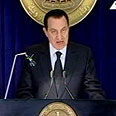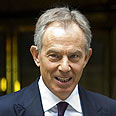

Some 250,000 protesters gathered at Tahrir Square Monday afternoon, according to the pan-Arab Al-Jazeera, which also reported that Egypt had appealed to Israel for riot-dispersal means. Jerusalem denied the report.
The network added that six of its journalists have been detained in Egypt after authorities ordered the closure of the network's Cairo office. The US immediately called for their release.
On Sunday an Egyptian journalist working for the Qatari news agency reported that two Israeli planes had landed in Cairo with the requested armament on board.
But on Monday the Foreign Ministry rejected the claim. "The report is totally false," it said in a statement. Sources at the ministry say Al-Jazeera and other networks intent on hurting the Egyptian government are fabricating reports that Israel is helping to quash the uprising.
President Shimon Peres, in his remarks on the uprising against President Hosni Mubarak, said that "no matter what they say, we owe Mubarak true thanks for always being a rock and working for peace and stability in the Middle East".
A coalition of opposition groups called for a million people to take to Cairo's streets Tuesday to ratchet up pressure for President Hosni Mubarak to leave.
American and other world leaders were also ramping up pressure for an orderly transition to a democratic system.
The coalition of groups, dominated by youth movements but including the outlawed Muslim Brotherhood, said it wants the march from Tahrir, or Liberation Square, to force Mubarak to step down by Friday.
The groups also called for a general strike Monday, although much of Cairo remained shut down, with government officers and private businesses closed.
"We don't want life to go back to normal until Mubarak leaves. We want people to stay away from their jobs until he leaves," Israa Abdel-Fattah, one of the protest organizers and one of the founders of April 6 group, a grassroots movement of young people that has been pushing for democratic reform since 2008.
Banks, schools and the stock market were shut for the second working day. Long lines formed outside bakeries as people tried to replenish their stores of bread, the main source of sustenance for most Egyptians.
Blair: Unrest could harm peace process
International Mideast envoy Tony Blair said Monday that a change in Egypt's leadership is inevitable after the week of anti-government protests that have gripped the country.
Blair said in an interview that "there's bound to be a process of change" in Egypt, the largest and most powerful Arab nation and a key Western ally.
"People want to get to a position where the Egyptian people are able to express their will in free and fair elections," he said. "But I think the watchword is change with care, because at the same time we have to make sure any change occurs with stability and order."
In particular, he said he was concerned that unrest in Egypt could disrupt the Israeli-Palestinian peace process.
"Change is going to happen, but it should be the right type of change and that process of change needs to be managed with order and stability so that you don't end up in a situation worse than the one we have and destabilizing the region," Blair said.
Ronen Medzini contributed to this report
- Follow Ynetnews on Facebook















